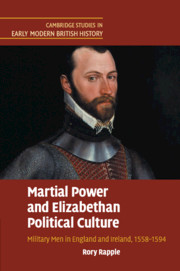Book contents
- Frontmatter
- Contents
- Acknowledgements
- List of abbreviations
- Notes on the text
- Political map of sixteenth-century Ireland circa 1534
- CAMBRIDGE STUDIES IN EARLY MODERN BRITISH HISTORY
- Introduction
- 1 Chimneys in summer
- 2 Martial men and their discontents
- 3 The limits of allegiance: English martial men, Europe and the Elizabethan regime
- 4 The captains and the Irish context
- 5 The limits of imperium: martial men and government
- 6 The limits of rhetoric: the captains and violence in Elizabethan Ireland to 1588
- 7 Unlimited indemnity: delegates versus viceroys
- Conclusion
- Bibliography
- Index
7 - Unlimited indemnity: delegates versus viceroys
Published online by Cambridge University Press: 02 July 2009
- Frontmatter
- Contents
- Acknowledgements
- List of abbreviations
- Notes on the text
- Political map of sixteenth-century Ireland circa 1534
- CAMBRIDGE STUDIES IN EARLY MODERN BRITISH HISTORY
- Introduction
- 1 Chimneys in summer
- 2 Martial men and their discontents
- 3 The limits of allegiance: English martial men, Europe and the Elizabethan regime
- 4 The captains and the Irish context
- 5 The limits of imperium: martial men and government
- 6 The limits of rhetoric: the captains and violence in Elizabethan Ireland to 1588
- 7 Unlimited indemnity: delegates versus viceroys
- Conclusion
- Bibliography
- Index
Summary
As your honour knoweth: where a practice is joined with an authority how available the same may be to compass what is expected.
Sir Richard Bingham to Walsingham, 4 September 1589In 1594, Oxford's university press produced Richard Beacon's Solon his Follie. Beacon's work, a dialogue between Pisistratus and Epimenides on the topic of reforming corrupt commonwealths, was a thinly disguised treatment of the problems of Elizabethan Ireland. With its university imprint, Solon stands as the academic high water mark of Irish studies in the late sixteenth century. The polemic has recently attracted the interest of intellectual historians because Beacon, an English planter in Munster, stands as the clearest example we have of a full reception of Machiavelli in Elizabethan England. Markku Peltonen, in particular, has outlined the extent of Machiavelli's influence on Beacon. Not only were many of the examples Beacon employed to illustrate his arguments culled wholesale from the Discorsi, much of his analysis of the political problem that Ireland posed for the crown followed exactly the same internal logic as Machiavelli's meditations on Livy. In terms of the developing situation in Ireland, the year of publication is particularly suggestive: in 1594, Ireland was already on the verge of tumbling into that stop-start conflict, later called the Nine Year's War.
- Type
- Chapter
- Information
- Martial Power and Elizabethan Political CultureMilitary Men in England and Ireland, 1558–1594, pp. 250 - 300Publisher: Cambridge University PressPrint publication year: 2009



